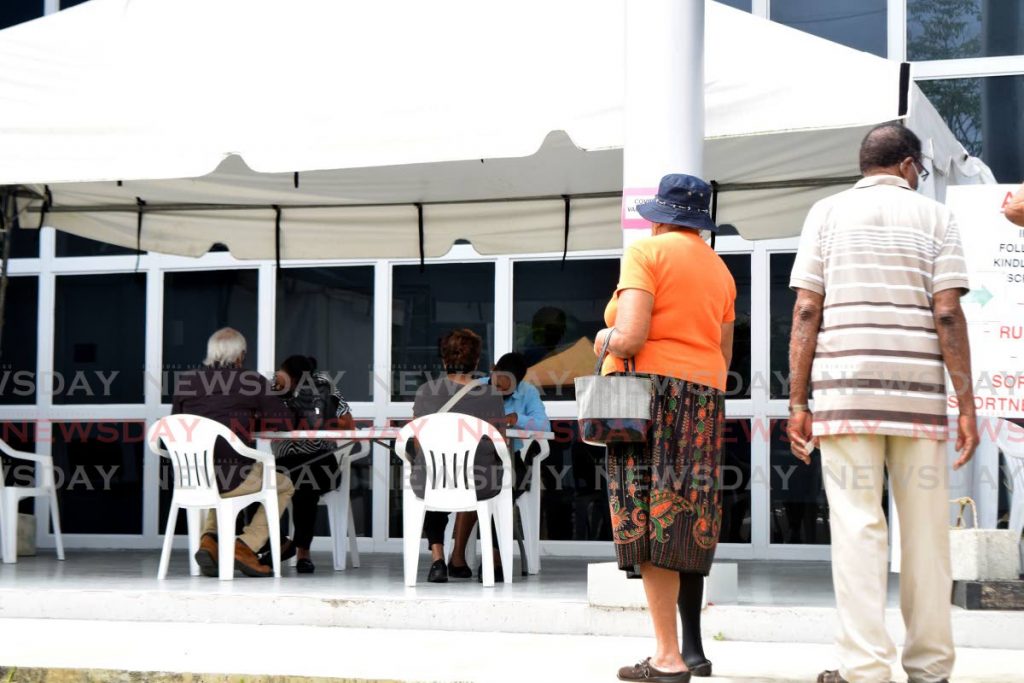Living on promises in the pandemic

While the rest of the western hemisphere begins to back slowly out of the epidemic, we listen to promises about when TT will get vaccines, at least to boost our confidence in being able to do almost-forgotten things like go to a Machel Montano concert, eat in a restaurant and send our children back to school.
We all know that the 33,600 doses of vaccine that hit the headlines last week amount to enough to inject
less than one per cent of the population. Do the maths and let everybody know how many days or months it will take, at 1,000 vaccinations a day, if you can get through to the 23 clinics, to get around to the rest of us.
We live on promises, like the vaccines from India, which finally arrived this week, the 2011 promise from the then minister of energy that the price of gas that sustained virtually all our downstream industries would be fixed (but wasn’t), or the promise by the subsequent minister of energy in 2017 that his administration, through the prime minister, would fix it (but didn’t).
Those are just some of the political promises we listen to as we watch what is left of our economy steadily dwindle. Business may not be able to offer the inflexibility of employment or the frozen protection that the public service offers, but it is the business sector that must generate income and pay taxes upon which the public service lives. It was ever so.
I remember one high official on the government benches in the Senate boasting that she had joined the teaching service many years earlier because “that meant I would never be fired, no matter what.”
There was an audible gasp in the chamber at the time at the unabashed honesty and lack of humility the statement portended. If you do not believe me, check Hansard. It was recorded.
There used to be a perfume ad that said: “Promise her anything, but give her Arpege”: the implied recipe for seduction. Politicians are even more dependent on that concept than perfume manufacturers.
However, as we witnessed this week, some politicians tell it like it is. The President and the Prime Minister both spoke of the non-productive but very expensive public service. Even the Ministry of Education bemoaned the paucity of truly committed and steadfast teachers in that service.
We must accept that as a cultural fact. We were stuck with service commissions at independence and have never admitted since that they are slow, cumbersome, inefficient and obstruct social and economic progress. In other words, we have not admitted, much less noticed, their obsolescence. I have no idea why they have not been abolished. Do you?
In the past two decades we have seen the closure of our income-generating energy resources, and as two very perceptive economists pointed out last week, in the face of its own advisers, ignored such advice as not to close the Petrotrin refinery. The advice, as I recall it, was to re-organise. It was vastly overstaffed and over-managed, a cash cow for the Boys, dominated by the union and badly in need of re-structuring. Well, we all knew that.
The advice was not accepted by a Cabinet which included only a single energy professional, whose 2017 recorded comments indicate he actually knew what had to be done, and the refinery was closed down. That the government-owned energy company owed a reported $3 billion per year in tax, which, like WASA, it did not pay, did not matter. Politicians knew better than industry experts. No one forces state operations to pay their taxes.
It sounds like the WASA report. In Trini-speak, "it is déjà vu all over again." Overstaffed, union-dominated, vastly over-managed, with double the numbers of managerial staff it needs (aka "a cash cow for the Boys"), so many that they are falling over each other giving contradictory orders. A consultant has been put in charge to clear up the mess.
When it was Petrotrin, it was committee after committee. The Prime Minister himself is quoted as saying about the government-owned energy company “there have been many instances and or arrangements which can only be described as gross mismanagement of the national patrimony, massive cost overruns, lengthy delays." He spoke of the gas-to-liquid plant which cost the country $3.15 billion and was sold for $215 million, and the de-sulphurisation plant for which we paid $2.89 billion and never opened because the structure was so faulty.
Who hired these people anyway? Who oversaw the contracts? Did anyone?Who is in charge here? Captain, the ship is sinking!
And now, is it true that because of the gas contracts that were negotiated unfavourably, the many downstream companies that depend on gas inputs are collapsing as well? Methanol Holdings has announced the closure of two of its plants in Point Lisas, affecting not just the employees there but all the small ring-fenced businesses, the service operators, the food vendors, the commercial assistants, the small entrepreneurs.
Economist Dr Terrence Farrell warned about this in the study he did on petrochemicals three or four years ago; so did journalist Curtis Williams. They were ignored by the decision-makers.
At one time, TT led the world in production and sale of methanol, urea and ammonia. It is as though, step by step, a decline has been forced on the country.
At one time people would emigrate to save their families. Now there is nowhere to flee to. Even the Venezuelans are leaving.

Comments
"Living on promises in the pandemic"